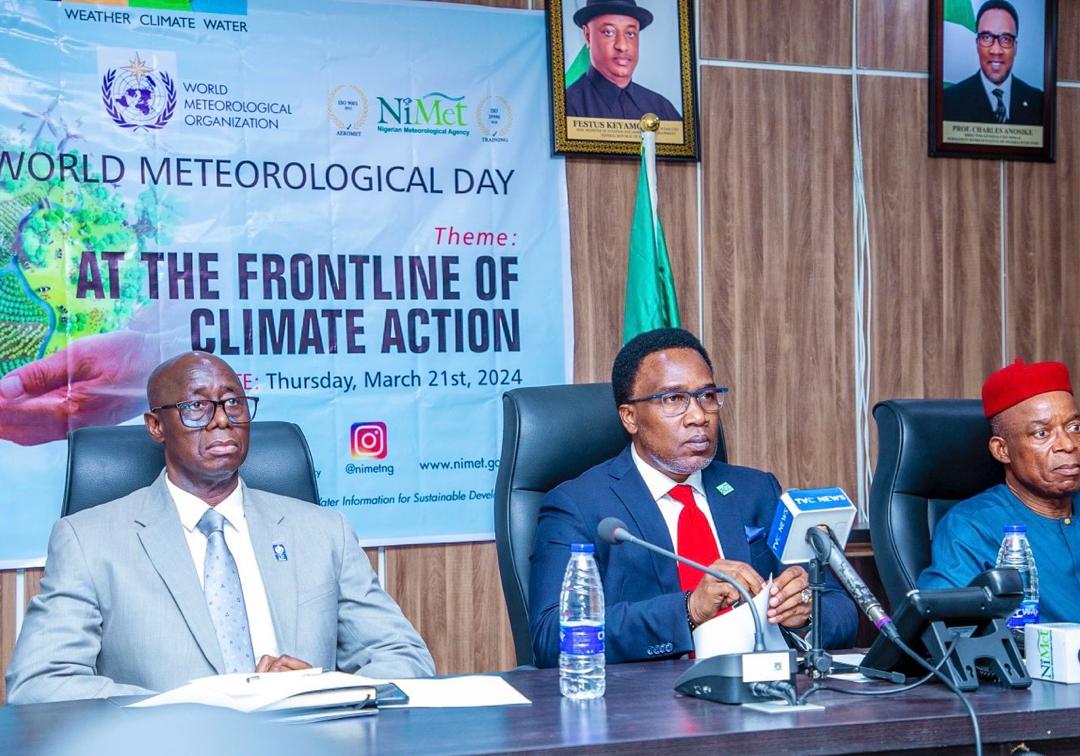Heat Wave in Nigeria: WMO calls for increased vigilance, responsiveness

The Permanent Representative of the World Meteorological Organisation (WMO) for North, Central, and West Africa, Mr. Bernard Gomez, has called attention of government agencies to the recent weather fluctuations in Nigeria, underscoring the transformative effects of climate change manifested through heat waves, thunderstorms, and dust haze.
He urged heightened vigilance from the Nigerian Meteorological Agency (NiMet) and emphasised the crucial role of community responsiveness to weather forecasts and alerts.
Gomez’s remarks came during the observance of World Meteorological Day 2024, held in conjunction with the Nigerian Meteorological Agency (NiMet).
The event, convened at NiMet’s headquarters in Abuja on Thursday, March 21st, aimed to emphasise meteorology’s pivotal role in fostering sustainable societies and tackling climate change challenges.
During the ceremony, Professor Charles Anosike, the Director-General/Chief Executive Officer of NiMet, stressed the significance of engaging young people and stakeholders in the celebration.
Recognising that March 23rd, the traditional date for the occasion, fell on a Saturday when students are typically at home, Professor Anosike advocated for early commemoration to ensure broader participation.
Professor Anosike reiterated NiMet’s commitment to enhancing the protection of lives, property, and livelihoods across Nigeria through accurate weather forecasts and climate resilience initiatives. He underscored the urgency of addressing climate change, characterizing it as an existential threat necessitating collective action to cultivate weather and climate-resilient societies.
“We recognise the indispensable role of meteorology in building a sustainable developed society. From providing accurate weather forecasts to mitigating the impacts of natural disasters, as well as building climate resilient societies, the Nigerian Meteorological Agency remains steadfast in its commitment to safeguarding lives, property, and livelihoods across the country”.
“Climate change poses an existential threat to our planet, exacerbating extreme weather events, disrupting ecosystems, and endangering vulnerable communities. In the face of these challenges, it has become imperative that we increase our efforts towards building a weather and climate-resilient society”.
“We must not relent at encouraging our young minds to build their capacity for meaningful contributions to effective climate actions that is impactful and measurable,” Anosike said.
Quoting WMO Secretary-General Prof. Celeste Saulo, Professor Anosike emphasised the current generation’s responsibility in safeguarding a safer and healthier world for future generations.
He called for meaningful contributions to effective climate actions to mitigate the impacts of climate change.
“The lives of future generations are in our hands. Our efforts today will ensure a safer, healthier world for future generations—a world where children thrive in harmony with nature,” added Anosike.
Expressing appreciation for Nigeria’s collaboration with WMO, Mr. Gomez commended Prof. Anosike and the Federal Government for their support.
He stressed the importance of collaborative efforts among governments, scientists, communities, and individuals to secure a sustainable future.
“The recent fluctuations in the weather witnessed in Nigeria, during this transition from dry to rainy season clearly demonstrate the extreme weather events that we can face across the country.
“The shifting weather phenomena from heat waves, thunderstorms and thick dust haze happening within a short period, are indicative of a changing climate which calls for concerted efforts by NiMet to be more vigilant and for communities to be responsive to weather forecasts and alerts,” said Gomez.
In a goodwill message, Engr. Clement Onyeaso Nze, Director General of the Nigeria Hydrological Services Agency (NIHSA), lauded NiMet’s role in providing data for socio-economic development.
He highlighted meteorology’s significance across various sectors and applauded NiMet’s contributions to regional meteorological forecasts, acknowledged by WMO.
The commemorative event also featured poetry and drama performances by students from several schools, including Anglican Girls Grammar School Gudu, Holy Family College Kuje, Government Secondary School Gwagwalada, and Government Science & Technical College Abaji.
As NiMet and WMO joined forces to observe the 2024 World Meteorological Day, their collective call for climate action resonated with the global imperative to address climate challenges and cultivate resilient communities for future generations.







